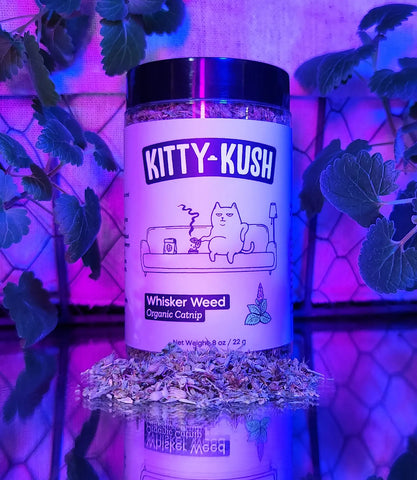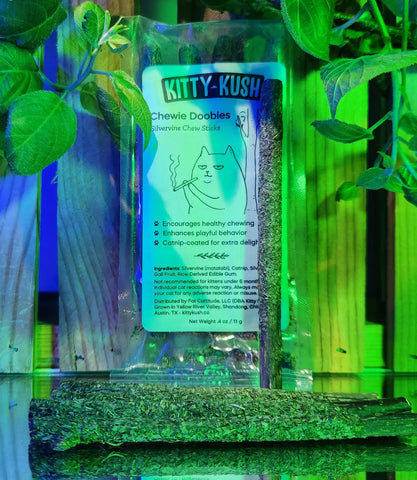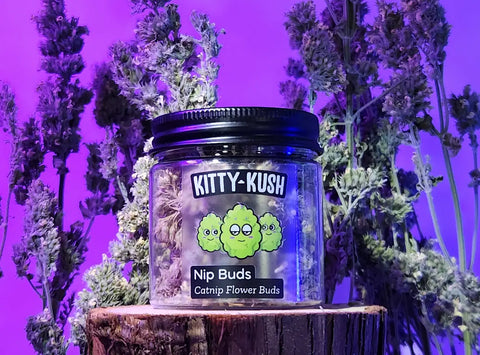Catnip, scientifically known as Nepeta cataria, is a herb famous for its effects on our feline friends. But what happens when humans decide to experiment with this seemingly innocuous plant? We're breaking down what catnip actually is, whether you can smoke it, and what kind of experience it offers (spoiler: it's not what you might think!).
What is Catnip?
Catnip is a herb from the mint family, known for its effects on cats. The key ingredient that triggers their playful, euphoric reactions is nepetalactone. When cats inhale or ingest catnip, they may become more excited, playful, or even mellow out. Interestingly, while it's famous for affecting our feline friends, catnip has a long history of use for humans as well, especially in traditional herbal remedies.

Effects of Smoking Catnip on Humans
You might be wondering: "Can smoking catnip actually do anything to people?" While it doesn't create the same "high" that substances like marijuana do, it can still have some effects on the human body. Here's what we know:
- Relaxation and Stress Relief: Smoking catnip can have a calming effect, similar to drinking a cup of chamomile tea. Some people report feeling more relaxed or even slightly sedated after using it, making it a natural way to unwind. [2]
- Potential Medicinal Uses: Catnip has been used in herbal medicine for centuries. It's often turned to for helping with issues like anxiety, insomnia, or digestive discomfort. While smoking it isn't the most common way to consume catnip, people have traditionally brewed it into teas for its soothing properties. [3]
- Antimicrobial Properties: There's some evidence that catnip may have antimicrobial properties. This could mean it might help with minor oral infections or promote overall oral health. While more research is needed, it's another reason catnip has been used in folk medicine. [4]
That being said, it's important to note that smoking catnip doesn't have the same potent effects as smoking other herbs, and the research into its impact on humans is limited. Most of the benefits are mild and haven't been thoroughly studied in scientific settings, especially when it comes to inhaling the herb.
Is Catnip a Drug?
Catnip isn't considered a drug—it's actually classified as an herb. It's legally available as a supplement and doesn't cause the strong psychoactive effects you might get from controlled substances. Instead, it's known for its mild, soothing qualities.
Risks of Smoking Catnip
While catnip is generally considered safe when consumed in moderation, smoking it carries potential health risks:
- Respiratory Issues: Inhaling smoke from any plant material can irritate the lungs and respiratory system.
- Exposure to Toxins: Smoking introduces particulates and potential toxins into the body.
- Side Effects: Excessive use of catnip, in any form, may lead to nausea, headaches, or general malaise.
Is It Safe to Smoke Catnip?
Given the potential risks and lack of significant benefits, smoking catnip is not recommended. The herb is best enjoyed for its aromatic properties or as a mild relaxant when consumed as a tea. If you're thinking about using catnip for medicinal reasons, it's a good idea to check with a healthcare professional first.
Conclusion: The Verdict on Smoking Catnip
While smoking catnip may seem interesting, especially because of its effects on cats, it doesn't offer a legal high or significant psychoactive effects for humans. Plus, smoking any plant material comes with health risks that outweigh any mild relaxation catnip might provide.
Instead of smoking it, you might want to try catnip as tea or in aromatherapy for a safer and more effective way to relax. Just remember, what works for cats isn't always safe or helpful for us!
Disclaimer: This article is for informational purposes only and isn't medical advice. Always consult a healthcare professional before using herbal supplements or alternative remedies.
References
- [1] Stang, David. Nepeta cataria. Wikimedia Commons. Retrieved from https://commons.wikimedia.org/wiki/File:Nepeta_cataria_3zz.jpg
- [2] Montgomery, Monty. Can You Smoke Catnip? Effects and Risks for Humans. https://www.theedgetreatment.com/can-you-smoke-catnip-effects-and-risks-for-humans/
- [3] Meyer, Nick. Catnip Offers Benefits for Digestion, Relaxation, Nausea Relief and More. https://althealthworks.com/catnips-vast-array-of-benefits-for-humans-include-relaxation-relief-from-cramps-and-more/
- [4] Vukić, Milena D., Vuković, Nenad L., Mladenović, Milan, Tomašević, Nevena, Matić, Sanja, Stanić, Snežana, Sapienza, Filippo, Ragno, Rino, Božović, Mijat, Kačániová, Miroslava. Chemical Composition of Various Nepeta cataria Plant Organs' Methanol Extracts Associated with In Vivo Hepatoprotective and Antigenotoxic Features as well as Molecular Modeling Investigations. https://pmc.ncbi.nlm.nih.gov/articles/PMC9415533/






